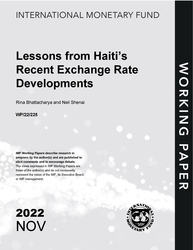
Lessons from Haiti’s Recent Exchange Rate Developments
Lessons from Haiti’s Recent Exchange Rate Developments
READ MORE...
Volume/Issue:
Volume 2022
Issue 225
Publication date: November 2022
ISBN: 9798400226038
$20.00
Add to Cart by clicking price of the language and format you'd like to purchase
Available Languages and Formats
| English |
Prices in red indicate formats that are not yet available but are forthcoming.
Topics covered in this book
This title contains information about the following subjects.
Click on a subject if you would like to see other titles with the same subjects.
Finance , Economics- Macroeconomics , Economics / General , Haiti foreign exchange rate , fragile state monetary policy , foreign exchange surrender requirements , foreign exchange intervention in fragile states , reserve money programming in fragile states , exchange rate development , IMF working paper 22/225 , Haiti foreign exchange exchange rate , foreign exchange management , money supply , Currency markets , Nominal effective exchange rate , Exchange rates , Exchange rate arrangements , Caribbean , Global , Central America , Sub-Saharan Africa
Summary
From August to October 2020, the Haitian authorities were successful at bringing about a sharp appreciation in the gourde/U.S. dollar exchange rate. This paper analyzes the factors behind this appreciation and its spillovers on the economy. It finds that foreign exchange surrender requirements had a statistically significant effect on the nominal exchange rate, while foreign exchange intervention by the central bank did not. Surrender requirements were also found to have raised trading costs and volatility in the foreign exchange market and contributed to the development of a wider parallel nominal exchange rate premium. This appreciation contributed to a decline in headline inflation during the episode while delivering some fuel subsidy-related savings to the government. Remittance-dependent households and exporters saw a drop in their purchasing power, and Haiti’s net external buffers were adversely affected. Following from these findings, the paper offers recommendations on ways to facilitate foreign exchange management and boost external sustainability while contributing to the central bank’s overall policy objectives.



